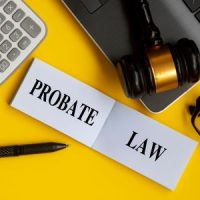Does a Probate Estate Have to Pay a Deceased Person’s Criminal Fines?

What happens when a person dies while awaiting a trial on criminal charges? The short answer is that the criminal prosecution effectively dies with them. Even if a defendant has already been tried and found guilty by a jury, if they die while their conviction remains on direct appeal, as a matter of law the entire prosecution must be voided.
This also voids any sentence the defendant received. That can actually have significant considerations for the late defendant’s probate estate. For example, say the trial court sentenced a defendant to pay a $10,000 fine. The defendant dies while his case is on appeal and he has not yet paid the fine. Under the circumstance, the defendant’s estate is not required to pay the fine. On the other hand, if the defendant already paid some of the fine while he was still alive, his estate probably won’t be able to get that money back.
Justice Department Looking to Seize $119,000 from Deceased Naples Resident’s Estate
While death may void a criminal fine, it does not necessarily prevent the government from taking civil action to recover money and property allegedly obtained by the deceased through unlawful activity. There are cases where the state and federal government continue to pursue such civil asset forfeiture against the estates of deceased individuals.
There is currently a high-profile example of this here in Florida. The United States Department of Justice is looking to seize a brokerage account worth about $119,000 from the estate of Roy McGrath, a former political operative who died under a bizarre set of circumstances that culminated in a nationwide manhunt.
McGrath, who was in his early 50s, grew up in Maryland and lived there most of his life. He was active in Republican politics from a young age, and in 2015 joined the administration of newly elected Maryland Governor Larry Hogan. The following year, Hogan appointed McGrath as executive director of the Maryland Environmental Service (MES), a post he held until becoming Hogan’s chief of staff in May 2020.
Five weeks later, however, McGrath resigned from the administration after the Baltimore Sun reported that he received an unusually high “severance payment” of $233,000 when he left his MES position. Shortly thereafter, McGrath and his family moved to Naples, Florida. But the severance payment attracted political and legal scrutiny. In October 2021, a federal grand jury in Baltimore indicted McGrath on multiple charges, including wire fraud and official misconduct.
McGrarth’s trial was scheduled to begin in March 2023. He failed to appear, however, leading to a manhunt. On April 3, 2023, FBI agents attempted to arrest McGrath in Tennessee. This prompted a chase that ended with McGrath’s death from a gunshot wound.
Although McGrath’s death ended the criminal case against him, the judge issued a civil forfeiture order for one of McGrath’s brokerage accounts, which was allegedly funded from the severance payment he received from MES. The Baltimore Sun reported that McGrath’s estate did not contest the seizure. The Sun added the matter was still to be sorted out by the Florida probate court overseeing McGrath’s estate.
Contact a Pompano Beach Estate Litigation Attorney Today
Even without a dramatic back story like the one above, many probate estates need to deal with creditor and other legal claims that may require litigation. A qualified Pompano Beach estate and trust litigation lawyer can represent you in such matters. Contact the offices of Mark R. Manceri, P.A., today to schedule a consultation.
Source:
baltimoresun.com/2024/10/28/roy-mcgrath-bank-account-doj/
